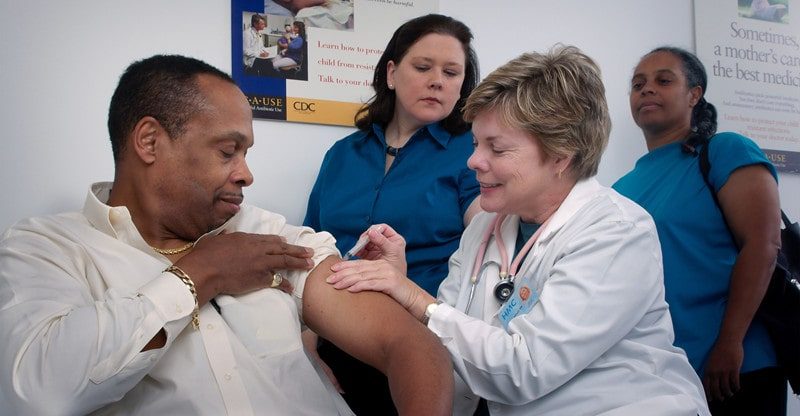It’s Never Too Late To Change To A Career In Healthcare
If the COVID-19 pandemic taught us anything, it’s that we are in need of more nurses, doctors, and healthcare specialists. If you’re interested in this type of work, this is the time to jump in.
The good news is that the healthcare field can be gratifying monetarily and emotionally. It’s also never too late to follow your passion, return to school, and achieve your dream of joining the growing healthcare industry.
Healthcare Needs You
So, why should you join the healthcare field at this point in your life? Because regardless of your age or the jobs you’ve worked in the past, you’re needed to fill the gaps in the world of medicine and wellness. People who generally do well in healthcare enjoy working around people and like the idea of healing patients’ wounds, both physically and mentally. They also can’t resist a new challenge every day they’re at work. If this describes you, you can’t afford to pass up the opportunity to change careers.
At this very moment, there are many in-demand healthcare professions to explore, including many people-forward positions like surgeons and family medicine practitioners. If that isn’t what you’re looking for, there are also health-related jobs that focus on other aspects of the industry, such as data analysts, billing specialists and careers related to quality control.
Regardless of the events that happen in our world, there will always be people who require medical care. Whether there’s a recession, pandemic, or anything else that comes into your path, you can keep working. You can’t get that type of security anywhere else.
Perks of Working In Healthcare
In addition to job security, there are also other great benefits to switching to a career in healthcare. One of them is that, due to the industry, you may not be required to work a regular nine-to-five. Many jobs instead only require you to work part-time, such as medical assistants, billers, coders, x-ray technicians, receptionists, and more.
If that weren’t flexible enough, you might be surprised to realize that many careers also allow you to work from the comfort of your home. In fact, the job market for remote healthcare work is expected to increase substantially over the next decade, especially when compared to other industries in the United States.
Remote work opportunities in healthcare offers additional flexibility for employees. For example, medical transcriptionists and medical billers may not need to be in the office to perform their jobs well. In addition, remote healthcare work and its associated offerings can be highly beneficial for patients.
For instance, physical therapists can help patients via telehealth by showing them the stretches and moves they need to do over the computer. They can perform said actions without having to leave their homes. These types of services are especially valuable for patients with limited mobility.
If you’re currently working in the medical field and you’re looking for a promotion or the opportunity to take a chance with a new team at work, this is the time to go for it. Again, hospitals and practices need good people in all levels of their organizations. Speak to management about your ambitions and return to school so you can achieve your dreams.
Online Resources and Prerequisites
Transitioning to a healthcare career requires meeting particular prerequisites such as specific education, training, and certifications. The advancement of digital learning platforms has simplified this journey by making educational resources more accessible and flexible.
For those interested in surgical specialties, comprehensive online preparation platforms are available. These resources provide a structured approach to understanding complex medical topics, offering practice tests and quizzes that mimic the examination experience.
These online platforms are designed with flexibility in mind to accommodate both full-time students and working professionals. Their unique feature of self-paced learning makes it possible to acquire essential knowledge and skills while seamlessly fitting into your current lifestyle. This advantage is evident in resources like the ABSITE exam online preparation, which allows you to progress at your own pace without interfering with your daily obligations.
These online resources provide study materials and facilitate active learning by explaining each answer. This approach enhances understanding and retention of information and helps identify areas requiring more focus.
In addition to traditional educational institutions, online resources have become integral to preparing for a healthcare career. While schools provide structured programs and formal degrees, online resources offer a flexible and accessible approach to learning. They provide many study materials, practice exams, and interactive modules catering to different learning styles.
As a bonus, you can also continue your education online. For example, if you already are a registered nurse, you can sign up for a BSN completion program that is fully taught online and this way progresses in your career.
By combining the benefits of school-based education and online resources, aspiring healthcare professionals can gain a well-rounded and comprehensive understanding of their field. Embracing the versatility of online resources alongside formal education can maximize your preparation, boost your knowledge base, and enhance your chances of success in the healthcare industry.
Going Back To School
For most higher-level medical jobs, you must go to school and get a degree or certification. Note that there’s nothing wrong with going to school later in life. The fact that you’re striving to improve yourself and reach your career goals is very commendable.
Some adults fear returning to school because they think they won’t fit in, but you aren’t the first or last to go to school later in life. In fact, according to the Postsecondary National Policy Institute, non-traditional students make up nearly 40% of all college attendees.
As an older college student, you’ll want to keep your eye on the prize. Look ahead in the syllabus, and set goals for what you hope to achieve each week. Don’t be afraid to befriend students because you never know if you’ll work with them in the future and may need a referral.
It’s important to know what you’re getting into and the time it will take to finish school and complete your assignments. This is especially true if you want to enroll in medical school. You’ll need to start by taking undergrad courses, which should include a mix of behavioral and social sciences classes, such as biology, physics, calculus, and biochemistry.
While you’re taking your undergrad classes, you’ll want to study and get good grades so you can reach the minimum GPA of 3.5 that most grad schools look for on a transcript.
You’ll need various other requirements to get into grad school, including a solid MCAT test score, research experience, a good mix of extracurriculars, and a personal statement that speaks to your goals and experience.
So yes, it’s never too late to change to a career in healthcare. We need more great nurses, doctors, counselors, and administrative personnel to help keep our nation strong and healthy.



